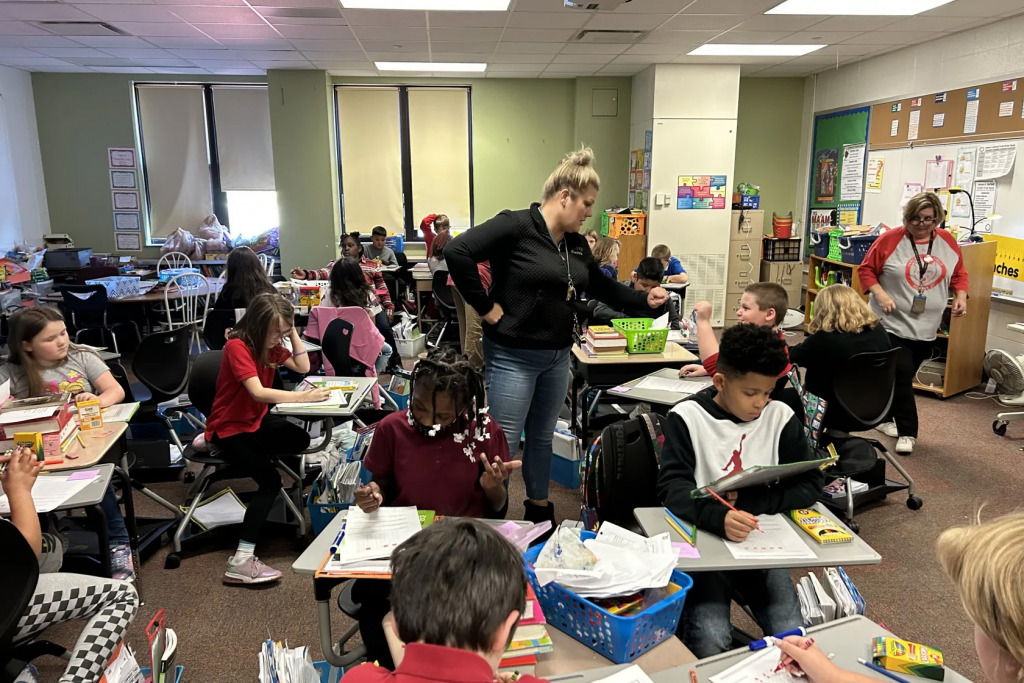Subscriber Benefit
As a subscriber you can listen to articles at work, in the car, or while you work out. Subscribe NowThis story was originally published by Chalkbeat Indiana.
At least 90% of the teaching staff directly impacted by Indianapolis Public Schools’ sweeping reorganization enacted last year will continue working in the district for the 2023-24 school year, the district said Thursday.
The staffing update from IPS showed that 300 staff affected by the school closures and mergers initiated by Rebuilding Stronger were placed elsewhere in the district. Most of the affected staff who got offers from the district to be placed in jobs for next year earlier than normal accepted those “Advanced Placement” offers, IPS said.
In addition, 109 teachers who were at Francis Parker Montessori School 56 and Paul Miller School 114, both of which closed at the end of the last school year, decided to make the switch to new schools with students. School 56 students are switching to James Russell Lowell Elementary, while School 114 students are now attending Frederick Douglass Elementary School 19.
As part of Rebuilding Stronger—which is the district’s effort to address dropping enrollment and address long-term fiscal challenges—IPS decided to close six schools, in addition to changing grade configurations at other schools and revamping academic offerings to make things like world languages and music more widely available. But these changes involve significant disruptions for staff.
The district decided to offer $10,000 stipends to teachers directly impacted by the changes, as well as $2,000 stipends to teachers indirectly impacted, like those who remain at the schools some of their colleagues must leave.
Sandy Bombick, the director of employment and operations for IPS, said at Thursday’s school board meeting that those bonuses were paid to impacted staff who met eligibility requirements. She also clarified that those retention bonuses were given for staff to remain at their schools through the end of the 2022-2023 school year.
The district also accelerated its typical timeline for identifying vacancies and working on staff placements, which allowed the district to be competitive with other potential employers.
IPS relied heavily on making sure it communicated well with staff through the process. The district’s strategies for communicating clearly included the formation of a Principal Advisory Board, which offered input on what they believed to be helpful in moving forward. In addition, impacted staff were met in person at their schools, and could share any questions or concerns that they had.
There is also a “Let’s Talk” option in the staff portal where teachers can research issues or submit inquiries.
“I think what’s key here is the cadence of communication, knowing that it was critical to keep open lines of communication through this,” Bombick said during her presentation to the school board.
Bombick also said the district plans to replicate this hiring and placement timeline going into the new school year and continue these communication strategies. She said despite the amount of change IPS is going through, she was “proud” of how the district had handled it.
Superintendent Aleesia Johnson said professional development has been and will continue to be offered to staff working with new instructional models or in new roles.
Of the more than 190 staff members who received Advanced Placement offers between Dec. 5 and Jan. 4 during the last school year, 114 accepted them. Seventy-seven chose to apply for new positions and go through the interview process all over again.
Roughly a week before the start of the school year on Monday, IPS reported there were 152 teaching vacancies, or a 12% classroom teaching vacancy rate. Bombick said staff leave the district for various reasons throughout the year, and cannot necessarily be linked to Rebuilding Stronger.
Chalkbeat Indiana is a not-for-profit news site covering educational change in public schools.
Please enable JavaScript to view this content.

